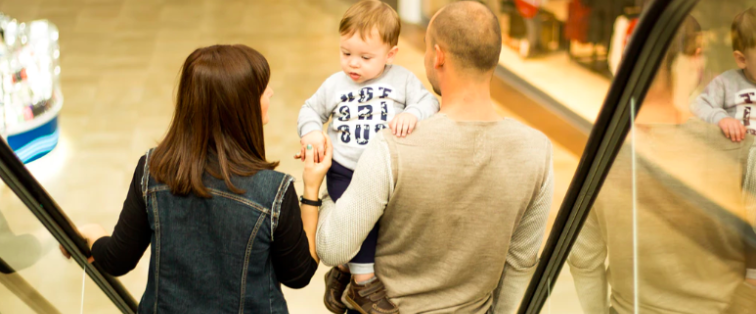Parents and Caregivers Go Back to School with the PriCARE Program

It’s a common scenario for many caregivers: you’re navigating through a crowded grocery store when your tired toddler starts crying over a giant tub of cheese puffs. What do you do? Do you try to distract her with videos on your phone? Yell back? Quietly threaten to take away her favorite toy forever? Do you hold your ground and ignore her screams while everyone stares? Or as the screams escalate, do you give in and grab the tub of puffs knowing you have just taught her that next time all she needs to do to get her way is scream a little louder and longer?
Dealing with the typical tantrums, crying and whining of a 2-year-old can be challenging for any parent. And for parents of young children with higher levels of disruptive behavioral problems, addressing these issues can be even harder.
We know that behavioral problems in young children can disrupt education and impact academic achievement. Children with behavioral problems enter kindergarten disadvantaged in speech, language, social, and school skills, and face an increased risk of poor long-term academic outcomes. In one study, parents of children with behavior problems were five times more likely to report their child wasn’t ready for their first year of school. Behavioral disorders in young children are also associated with a higher risk of mental health disorders. For caregivers, children’s behavioral problems can create stress, disrupt family activities, and even increase the risk of harsh parenting and child maltreatment. So, how can we help parents dealing with the scenario above or with others they may encounter with their child?
Class in Session: Positive Parenting
Addressing behavior concerns early on in a child’s development can be effective for young children; however, the majority of children with behavioral problems never receive services due to long wait times, cost, perceived stigma of receiving mental health treatment and other barriers. Not surprisingly, behavioral problems are one of the most common concerns parents raise with their pediatricians. Therefore, the pediatrician’s office offers an ideal venue to address behavioral issues and provide intergenerational support to both the parent and child.
Recognizing this opportunity, we started the PriCARE program at Children’s Hospital of Philadelphia (CHOP). We offer this six-week group positive parenting program to families seeking care at five CHOP primary care sites. PriCARE, an adaptation of Child Adult Relationship Enhancement (CARE), is designed to strengthen parent-child relationships, improve child behaviors and decrease parenting stress.
Two PriCARE trainers, who are typically social workers, psychologists or counselors, facilitate each group using hands-on activities, including role-playing and brainstorming. The trainers cover topics such as understanding children’s behaviors and the importance of play. They teach parents skills for giving attention to children’s positive behaviors while ignoring minor misbehaviors.
To fit in with busy schedules and address some of the barriers parents may face in participating, we offer morning and evening classes and provide on-site child care. Generous support from our partners allows us to offer PriCARE free of charge and provide food and transportation tokens.
PriCARE is Making the Grade
To date, more than 350 parents, grandparents, foster parents and other caregivers have participated in PriCARE. And the results have been positive! A randomized controlled trial of PriCARE at a CHOP primary care location in South Philadelphia demonstrated decreased frequency and severity of problem behaviors, increased parental empathy and decreased belief in the use of corporal punishment.
Parents have described the benefits of the group structure of PriCARE and the comfort in knowing they are not “the only person dealing with these struggles.” Describing the impact of the program on her parenting, one mother said, “I’m not as worried if I’m a bad mom or I don’t know what I’m doing. I feel more confident…in a lot of decisions that I make.” Another parent explained, “I encourage her to do positive things…she changed a lot, not just at home but as well as in school…her behavior is much better. She’s more calm and relaxed.”
Pivotal to the program are the PriCARE trainers who lead the groups and create a safe learning environment. One parent reported, “The trainers were really knowledgeable but also kind and understanding, so you felt like you could be honest with a bunch of people who are having trouble with their kids…in a safe space where you weren’t going to get judged.”
Continuing Education
Since our initial PriCARE pilot at a single site, we have grown exponentially. We recently launched a PriCARE for foster parents program and are planning to pilot PriCARE for Spanish-speaking families and to expand the program to additional locations. We are regularly collecting feedback from trainers and parents to inform program improvements, and are continuing our research evaluation of the program in different primary care settings to identify the best strategies for implementation and dissemination.
Through PriCARE, we are bringing parents back to school for one of the most difficult yet rewarding jobs. Some parents attend because they are seeking help in addressing a child’s disruptive behaviors. Others want to gain new parenting skills and strengthen their relationship with their child. Ultimately, we know children do better when their caregivers do better—and our hope is to support each parent early on in their child’s development to create healthier outcomes for the whole family.
Devon Kratchman is a former clinical research coordinator at PolicyLab.
